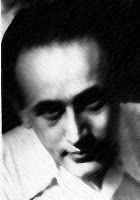I Hear Poem by Paul Celan
I Hear
Rating: ★3.3
I hear, the Axe has flowered,
I hear, the Place is un-nameable,
I hear, the Bread, that looks on him,
heals the Hanged-Man,
the Bread, his Wife baked for him,
I hear, they name Life
our sole Refuge.
COMMENTS OF THE POEM
Fabrizio Frosini
26 December 2015
It gives two images which almost sound surreal, a flowering axe and bread that looks upon a hanged man. The more one thinks about them, though, the more they make a grim sense. (Ashok)
15
0
Reply
READ THIS POEM IN OTHER LANGUAGES
This poem has not been translated into any other language yet.
I would like to translate this poem
Poems By Paul Celan

''Axe has flowered'' is the easier image to decipher. Along with ''the place can’t be named'', it refers to how the injustices we commit against the Earth and each other, including the killing of millions, wash away with time. Actually, it’s worse than that. If the axe is an executioner’s tool, then it can refer to even our justice washing away with time, too. This is Providence of a kind, weirdly enough. Perhaps we’ve messed up human history such that we don’t have anything substantial to bequeath. Maybe we should be put gently aside, as opposed to flooded away. Four times in the poem we are told ''I hear''. How the speaker hears anything is an open question. This must be hearing in the sense of rumor, as flowering makes no sound and ''the place'' cannot be named. Ultimately, that means the lack of hearing is hearing. ''I hear the bread that looks on him heals the hanged man, the bread his wife baked him''. There are overtones of Holy Communion in the love constituting the bread. But the bread merely ''looks'' on the hanged man; it does not feed him and stays separate. How it heals is most strange, as we do not hear that the man resurrects. The bread is remembrance; the past is heard. The hanged man is whole and healed in the past. But the past is just as much forgetting as it is remembrance. The problem of the flowering axe and places that can’t be named remains. Just or unjust, remembered or not, it doesn’t seem to matter. What stands out from the bread looking at the hanged man is a third dualism, distance and lack of distance. On the one hand, that bread does not even touch the corpse points to how our memories are separate from the person or object remembered. On the other, the bread was given by a mourning lover. Not remembrance, but the will to remembrance. That they call life the only refuge is both a truth and a half-truth. It’s a half-truth in the sense we go to the past, we try to make love define time. We struggle against the idea of life as the only refuge. And yet we’re here, doing what we can. (Ashok)